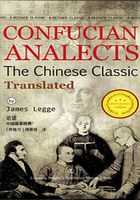
CHAPTER 1
Confucius said of the head of the Ke family, who had eight rows of pantomimes in his area, "If he can bear to do this, what may he not bear to do?"
HEADING OF THIS BOOK. — 八佾第三. The last book treated of the practice of government, and therein no things, according to Chinese ideas, are more important than ceremonial rites and music. With those topies therefore, the twenty six chapters of this book are occupied, and 'eight rows'. the principal words in the first chapter, are adopted as its heading.
1. CONFUCIUS' INDIGNATION AT THE USURPATION OF IMPERIAL RITES. 季氏, by contraction for 季孙氏; see II.5.氏 and 姓 are now used without distinction, meaning 'surname', only that the 氏 of a woman is always spoken of, and not her 姓. Originally the 氏 appears to have been used to denote the branch families of one surname. 季氏, 'The Ke family', with special reference to its head, 'The Ke', as we should say. 佾, 'a row of dancers', or pantomimes rather, who kept time in the temple services, in the 庭, the front space before the raised portion in the principal hall, moving or brandishing feathers. flags, or other articles. In his ancestral temple, the Emperor had 8 rows, each row consisting of eight men, a duke or prince had 6. and a great officer only 4. For the Ke, therefore, to use 8 rows was a usurpation, for tho' it may be argued, that to the ducal family of Loo imperial rites were conceded, and that the offshoots of it (II.5) might use the same, still great officers were confined to the ordinances proper to their rank. 谓is used here, as frequently, in the sense—'to speak of'. Conf. remark may also be translated, 'If this be endured, what may not be endured?' And this is probably the correct interpretation, for there is force in the observations of the author of the 四书翼註, that this remark and the following must be assigned to the sage during the short time that he held high office in Loo.
